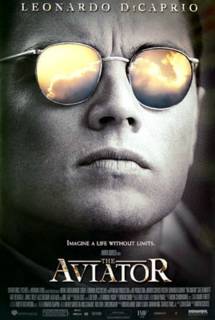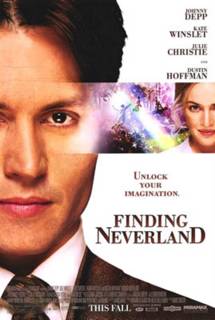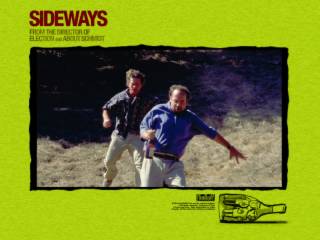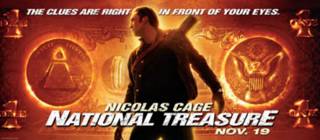It was a frenzied year marked by monumental epic films bombing monumentally as well in the ticket registers. It was the year that saw a couple of documentaries blaze through mainstream cinemas. A visionary filmmaker/actor's personal passion brought independent filmmaking into a raging victory that took the box office gates by millions of dollars. And there are genre movie busting through their formulaic origins and surprisingly transformed into critical and more importantly commercial hits.
There are also films that are personal and smaller in scope yet provided that knock-out power punch - that great emotional squeeze that strains and clutches the viewer in a procession of passionate outbursts of joy, guilt, pleasure, love, anguish, bewilderment, awe, lust and cinematic illumination.
What follows is my list of favorite films from the past year. It is a varied list ranging from the truly outstanding (read: universally adored) to the bizaare choiches that provided guilty pleasure to not so few cinema lovers.
1) The Motorcyle Diaries: Not really my original choice for best film of the year but the seeming gravity of its theme makes it one very important film. An affectionate homage to the great revolutionary Che Guevarra, the film chronicles that year in his life when he took the road with his friend and traveled across the South American continent to discover the beauty of its people and the countryside. This little trip would eventually serve as the most influencing journey of his life. The journey would stir a calling that would inspire him to pursue and dedicate his life towards the liberation of his poor and persecuted compatriots from the repugnant horrors of capitalist oppression and injustice. The film does not, however, go into his revolutionary days, instead, what is presented is a loving portrait of a man going through an exacting awakening in so young a life. The haunting images of traditional native Americans conjured by Brazilian filmmaker Walter Salles and the gentle yet ferocious performance of its lead, "Y Tu Mama Tambien's" Gael Garcia Bernal give the film an ardent rein that never lets go.
2) The Aviator: Martin Scorsese will finally win the Oscar with his supremely brilliant film. He hits all the right marks in this soaring film about the flamboyant and eccentric life of legendary airplane builder and pioneer of independent filmmaking Howard Hughes. From the colorful '30s art deco set pieces to the bang-up musical score. From the kinetic camera work and splendid aerial photography to the grand visual effects. From the magnificent actors to the faultless editing and writing. All these were achieved in a film that is so charming and zestful the much touted nearly three hours running time don't feel like it at all.
3) Sideways: Ah, the ironic joy of melancholy as romanticized in this beautiful film. Alexander Payne has crafted a perfectly-tuned film about a couple of middle-aged buddies who take on a road trip across the wine valleys of northern California only to be confronted by painful realization about their lives and how badly they have lived it. This gem of a movie features a wonderful cast that blends along with the director's vision that great comedies are those that cater to the everyday follies of ordinary people and not the laugh-a-minute slapticks comedies have evolved into. Paul Giamatti leads a wonderful cast as a failed writer who has bottled up all his emotions he can no longer afford to set himself loose into the world and experience real happiness.
4) Vera Drake: Britain's Mike Leigh has directed this disturbing and involving drama with so much tenderness and insight that the viewer is left perplexed with an overwhelming emotion of sympathy and compassion for a character whose intentions are pure but whose acts morally questionable. The film is effectively lifted to greatness by the charming and heartbreaking turn of its lead, Imelda Staunton, whose portrayal of a '50s housewife. who so selflessly dabbles in abortion, is just so extraordinary you can't help but rise and applaud for her in the blank darkness of the cinema for a performance that is unquestionably the best of the year.
5) Friday Night Lights: The finest football movie i've ever seen. This film by part-time actor Peter Berg has that emotional blow rarely found in movies about sports. The raw and graphic football scimmages are masterfully assimilated with the special detailing of the personal lives of the central characters - their simple dreams and aspirations, fears and apprehensions. Based on real people and real events, this film chronicle remarkably tackles the subject matter and hits a solid touchdown.
6) The Passion of the Christ: That Mel Gibson would spend $35 million of his own money to fund this film is enough big reason to honor the man with a thunderous applause. But, no, he not only made the film, he made it so great and realistic that not only did he invite trouble he also opened the floodgates that indirectly swamped the hypocrisy of not so few people and reminded the world of the real essence of His sacrifice. Beautifully told and photographed, the film spotlights the last twelve hours of Jesus Christ's life on earth. His sufferings were viciously recreated it was so violent that every lash at Jesus brings a heart-wrenching pain of guilt in almost everyone's heart.
7) Closer: Mike Nichols has masterfully constructed this caustic tale of love, lust, deception and betrayal about four people who are fatefully brought together by the deceptive lure of love to form a roller-coaster of a love quadrangle. This film puts into focus the loftiness of commitments people so eagerly promise at the start of every relationships only to sink to the lowest of irrational rage when faced by the bitter truth of their partner's infidelities. Natalie Portman vibrantly bookends this convoluted and vicious tale as a stripper who doesn't completely reveal all of herself.
8) Spider-Man 2: Wow, this movie has all the elements of popcorn filmmaking and yet encompasses such a broad spectrum of emotions rarely found in movies based on cartoon characters. Sam Raimi has showcased a mastery of this thrilling genre with a telling sequel that reveals the flawed human side of a superhero who is confused and sorrowed on the sacrifices he gives to an impassive society and his forlorn longing for his beloved Mary Jane. This film also offers some of the best fight sequences and dazzling visual effects of the year. It also created one of the most original and sympathetic movie villains ever. In a year that saw the equally impressive "The Incredibles", the superhero action genre has finally evolved into a distinguished franchise.
9) House of Sand and Fog: This late 2003 release got into our town in early February and i thought it was one of the lamentable omissions from last year's Oscar field. This a powerful and disheartening drama involving the struggle of three lost characters over a property that represents the fulfillment of their dreams. One for the rebuilding of his family's life after an unceremonious overthrow from his own country. Another trying to reclaim a property that was her only link to a sane life she ever had. And another trying to put together a new life after he has sacrificed a marriage for that one love he has been longing for all his life. This terrible crossing of path leads to an emotional turmoil that ends in an unspeakable tragedy that leaves the audience helpless and devastated.
10) Fahrenheit 9/11: Michael Moore's searing documentary took the highest honors at this year's Cannes Festival and was one of the major point of debates during the hotly-contested American presidential elections. It is a daring documentary that attempts to present to the public how bad a president George Bush is. Using the September 11 tragedy as his springboard, Moore goes into a series of slanderous accusation and rampaging attacks against the president that at times come out funny but oftentimes outrageous. This powerful film lifted the documentary genre from the confines of arthouse cinemas into the marketplace of cineplexes.
There are films that i also really liked but could not be accomodated in my limited top ten list. There's "Ray", a sentimental biopic about the life of Ray Charles. There was also "Finding Neverland" - a tearjerker based on the life of Peter Pan creator, J.M. Barrie, "Napoleon Dynamite" - one of the most original and quirky films of the year, "Harold and Kumar go to White Castle" - a hilarious road movie that is so silly it made me laugh the hardest this year, "The Dreamers" - Bernardo Bertolucci's lyrical homage to French Cinema, Nick Cassavetes' "The Notebook " - a passionate love story that transcends the barrier of dementia, "Sky Captain and the World of Tommorow" - a movie made with special effects, its a credit to the actors for their effective turns given that they had to act amidst blue screens. And how can i forget the lavish visuals and stunning fight sequences of "House of Flying Daggers", Meryl Streep's menacing turn in Jonathan Demme's disturbing "The Manchurian Candidate" and Tom Cruise's maniacal assassin in "Collateral".
And i cannot end this without a caveat. Clint Eastwood's much-admired "Million Dollar Baby" has yet to be released in a theater near me. I also failed to catch "Maria Full of Grace" and "Bad Education.".






